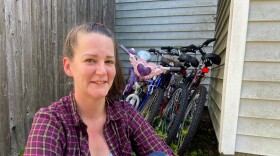Safe Passage, a nonprofit based in Northampton, Massachusetts, will no longer operate its local domestic violence emergency shelter. Instead, the organization will embrace a community-based program focused on helping survivors access housing and economic empowerment.
Marianne Winters, the executive director of Safe Passage, is defending the change as both a budgetary and strategic move for the organization.
Marianne Winters, Safe Passage: This decision has been long in coming. We started seeing a significant trend in the decrease availability of housing, increased impact of poverty and domestic violence in poverty, along with extended stays in our emergency shelter because of the lack of affordable housing and lack of options that many survivors were facing. So, because of the longer stays, we had a decrease in population of folks that we could serve.
And very often most survivors were coming from other parts of the state and wanted to relocate back in the part of the state where they came from. Housing advocacy for shelter guests from out of town, basically, became more and more difficult.
We know that we can be most effective with housing assistance through deep connections and knowledge and being enmeshed in our own communities. So, this shift in program focus is an attempt to better serve the people from Northampton, while we make sure that we retain some level of emergency, short stays through a hotel situation. And we maintain our connection to the overall emergency shelter network for folks who do need that safe and secure place for a period of time.
Carrie Healy, NEPM: So, you're saying that safe passage will continue to aid survivors of interpersonal and domestic violence without the emergency shelter, by addressing the needs earlier on in this process? Is that what I'm hearing?
Yes. We're going to be stepping up our outreach with a particular focus on reaching people who are most marginalized and educating the community about the warning signs, early stages, what they can do while their level of resources may be higher and a little bit more intact. And we will always maintain that ability to work with people who are at high risk for homelessness, for poverty, for severe abuse. That's not going to go away.
But what we're going to be focusing on is helping incorporate into safety planning and the practical work of building financial stability, financial self-sufficiency, planning for the economic factors that go into housing, and also making decisions. At that point, people have more options available to them. And very often, [their] social network, people in their lives who can be supportive [and] provide some temporary relief, perhaps — that's really our strategy that we're moving toward.
Another part of our strategy will be really being much more vocal on public policy issues. The fact that no one can pick up a newspaper any longer or go online and have a few options for an apartment within a couple of weeks is a huge change that's happening now, that was not the case 50 years ago.
And people might feel like they're going to need to stay in in a bad relationship in order to just have somewhere to stay.
That's true. The dilemma of choosing safety versus choosing financial independence or poverty is a huge dilemma that's faced by many, many people.
So, with the closure, will any of your staffers who worked in the shelter be losing their jobs?
The part-time staff who work weekends and overnights — yes, have been, will be laid off.
How many of them were there?
Five part-time people. And then we're retaining three people, who worked full time at the shelter, to start up this new initiative.
So, Northampton of 2023 is a very different Northampton than one of about 45 years ago when that emergency shelter model was developed. Can you talk about the challenge in addressing evolving, culturally specific and trauma-informed needs of the survivors that you come in contact with?
Sure. You know, in 1977, when we, along with many, many other organizations around the country, opened a shelter, the thinking in general around domestic violence was that if violence is happening at home, then someone needs to relocate, you know, relocate even temporarily.
Now, because of the impact of housing shortages and affordable housing and the impact of even the invention of the internet, where it's not just solely about location, it's also about security from technology abuse, from digital financial abuse. All of those things that go into creating stability for someone while they include housing, they also include a whole range of other connections and things that happen in a family's life, that don't necessarily have to do with location. So, we're looking at a very different world than a half a century ago.







